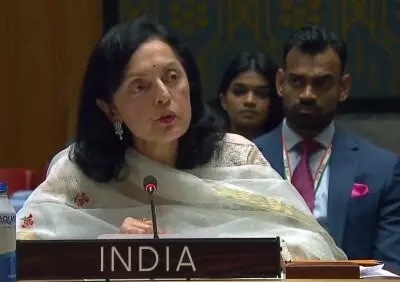
India, Russia, China abstain vote on UNSC resolution regarding Myanmar
text_fieldsUnited Nations: India abstained along with China and Russia on a UN Security Council resolution about Myanmar that sought the return of democracy there and the release of political prisoners, Aung San Suu Kyi foremost among them.
On Wednesday, the other 12 nations in the 15-member organisation voted in favour of the long-awaited resolution, which came 22 months after the fall of Myanmar's democratically elected government.
It was proposed by Britain, which is in charge of Myanmar in the Council, after long negotiations to reach a consensus, which it failed to do, but softened the proposal to avoid vetoes by Russia and China.
India's Permanent Representative to the UN, Ruchira Kamboj, appealed for the release of political prisoners and the restoration of democracy but said the resolution will not contribute to achieving those goals.
The resolution may "entrench the parties in their inflexible positions rather than encourage them to pursue an inclusive dialogue," she said explaining India's abstention.
The complex situation in Myanmar requires "quiet and patient diplomacy," she added.
She pointed out that the stability of Myanmar directly impacts the national security of India, which shares a 1,700-kilometre border with it.
The welfare of the people of Myanmar is of "utmost priority" and at "the core of our efforts" there, Kamboj said.
Until Wednesday, the Council had not passed any resolutions on Myanmar's long stints of military rule, starting with the first coup in 1962 and recent efforts were met with threats of Russian and China vetoes.
The junta of the military known as Tatmadaw is not represented at the UN because the General Assembly's accreditation committee has allowed the representatives of the democratically-elected government led by State Counsellor Aung San Suu Kyi to continue in Myanmar's seat.
The resolution also demanded the "immediate and concrete implementation" of ASEAN's five-point consensus, respect for human rights, and accountability for those who violate them and unhindered humanitarian access to those in need.
The ASEAN plan adopted in April also called for mediation by its President's representative and a visit by a special envoy to meet all the parties.
Britain's Permanent Representative Barbara Woodward said, "Today we have sent a firm message to the military, that they should be in no doubt: we expect this resolution to be implemented in full."
"It is also "a clear message to the people of Myanmar" that the UN backs their rights, wishes and interests," she added
US Permanent Representative Linda Thomas-Greenfield said that the continuance of the military regime was a threat to regional peace and security,
"Beyond the tremendous suffering in Burma, the brutality of the military regime continues to contribute to regional instability and a growing refugee crisis, having a direct and detrimental impact on regional peace and security," she added.
Russia's Permanent Representative Vasily Nebenzia said that the situation in Myanmar was not a threat to international peace, which is in the realm of the Council, but the resolution was dealing the human rights which should be taken up by the appropriate General Assembly committee.
The human rights issue was being politicised, he added.
China's Permanent Representative, Zhang Jun said that the resolution violated the territorial integrity of Myanmar and it was important to promote talks and allow the ASEAN to deal with the country.
With inputs from IANS






